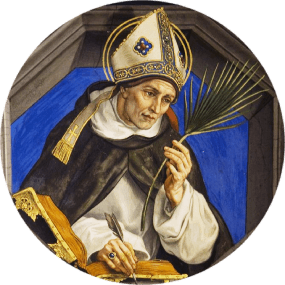
15 November
Optional Memorial
St Albert the Great (1193-1280)
Bishop and Doctor of the Church
Born 1193 Lauingen, Duchy of Bavaria
Died 15 November 1280, Cologne, Holy Roman Empire
Venerated in Catholic Church
Feast 15 November
Patron Archdiocese of Cincinnati, Ohio; medical technicians; natural sciences; philosophers; schoolchildren; scientists; students; students of theology
Today the Church celebrates St. Albert the Great, son of a German nobleman, as an Optional Memorial. While studying at Padua when the Master General of the Dominicans, Jordan of Saxony, succeeded in attracting him to that Order. He was to become one of its greatest glories. After taking his degrees at the University of Paris he taught philosophy and theology at Paris and then in Cologne. St. Thomas Aquinas was among his pupils. His knowledge was encyclopedic. In 1260 he was named Bishop of Ratisbon and devoted himself zealously to the duties of his office. But soon resigned in order to continue his teaching and research. St. Albert died in Cologne on November 15, 1280.
COLLECT
O God, who made the Bishop Saint Albert great by his joining of human wisdom to divine faith, grant, we pray, that we may so adhere to the truths he taught, that through progress in learning we may come to a deeper knowledge and love of you. Through our Lord Jesus Christ, your Son, who lives and reigns with you in the unity of the Holy Spirit, God, for ever and ever.
Things to Do:
- Learn more about St. Albert from the Catholic Encyclopedia, Dominicans.
- St. Albert is an especially apt patron for scientists because he made his love of truth about nature into an instrument of his love of Christ;
- Read what Pope Benedict XVI wrote about science and faith.
St. Albert the Great
Albert, the “light of Germany,” called the Great because of his encyclopedic knowledge, was born in 1193 at Lauingen, Donau. He studied at Padua, where under the influence of the second Dominican general, he joined the newly-founded Order of Preachers (1223). Soon he was sent to Germany, taught in various cities, particularly Cologne; Thomas Aquinas was his student. In 1248 he received the honor of Master in Sacred Theology at Paris. Throngs attended his lectures.
In 1254 Albert was chosen provincial of his Order in Germany. For a time he lived at the court of Pope Alexander II, who in 1260 made him bishop of Regensburg; two years later, however, he returned to his community at Cologne. There he acted as counselor, peacemaker, and shepherd of souls with great success. He died at the age of eighty-seven. Pope Pius XI numbered him among the ranks of the saints on December 16, 1931, and declared him a doctor of the Church. Much of his life was given to writing. His twenty-one folio volumes are devoted to commentaries on Aristotle (whose works were just then becoming known in the West) and the Bible. Legend credits him with drawing the ground plans for the cathedral at Cologne. Albert, the greatest German scholar of the Middle Ages, was outstanding in the fields of natural science, theology, and philosophy.
—Excerpted from The Church’s Year of Grace, Pius Parsch
Source : Catholic Culture